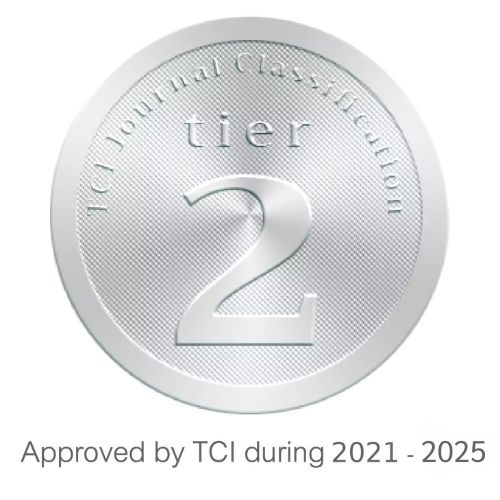การควบคุมธุรกิจบริการแพลตฟอร์มดิจิทัล กรณีศึกษากฎหมายสหภาพยุโรป
The Regulation of Digital Platform Service Businesses: A Case Study of European Union Laws
Keywords:
แพลตฟอร์มดิจิทัล, กฎหมายสหภาพยุโรป, กฎหมายธุรกิจAbstract
ความเจริญก้าวหน้าของเทคโนโลยีดิจิทัลได้ส่งผลให้สื่อดิจิทัลเข้าถูกนำมาใช้ในการอำนวยความสะดวกในชีวิตประจำวันมากยิ่งขึ้น และทำให้ผู้ประกอบธุรกิจหลายรายเลือกใช้แพลตฟอร์มดิจิทัล(Platform Digital) ที่เป็นสื่อออนไลน์เป็นสื่อกลางในการให้บริการมากยิ่งขึ้น ทำให้เกิดการให้บริการแพลตฟอร์มดิจิทัลเป็นจำนวนมาก แต่ประเทศไทยในปัจจุบันยังไม่มีกฎหมายที่รองรับธุรกรรมในการซื้อขายสินค้าทางออนไลน์ที่เป็นหนึ่งในการดำเนินธุรกิจแพลตฟอร์มดิจิทัลหรือกฎหมายว่าด้วยการควบคุมธุรกิจบริการแพลตฟอร์มในประเทศไทย ด้วยเหตุนี้หากมีการซื้อขายกันในลักษณะดังกล่าว จึงต้องอาศัยหลักกฎหมายทั่วไปตามที่บัญญัติไว้ในกฎหมายต่าง ๆ ที่แยกย่อยอยู่ในกฎหมายหลายฉบับในควบคุมการซื้อขายสินค้าทางออนไลน์ จึงอาจส่งผลให้เกิดปัญหาของกฎหมายที่อาจมีความขัดกันในบางบริบท จากการศึกษากฎหมายของประเทศไทยรวมถึงกฎหมายที่กำกับดูแลธุรกิจแพลตฟอร์มดิจิทัลในสหภาพยุโรปที่มี การดำเนินการบังคับใช้อยู่ในปัจจุบันและอยู่ในระหว่างการพัฒนากฎหมายเพื่อให้สอดรับการความเปลี่ยนแปลงไปของสังคม เช่น กฎหมายอีคอมเมิร์ซของสหภาพยุโรป (EU E-Commerce Directive 2000/31/EC) กฎระเบียบสหภาพยุโรปว่าด้วยการประกอบธุรกิจแพลตฟอร์มออนไลน์ (EU Regulation on Platform-to Business Relation หรือ P2B) ร่างกฎหมายบริการดิจิทัล (Digital Service Act) และกฎระเบียบสหภาพยุโรปว่าด้วยตลาดที่แข่งขันได้และยุติธรรมในภาคดิจิทัล (Digital Markets Act) ซึ่งวางหลักการกำกับดูแลในรูปแบบลักษณะของกฎหมายดังกล่าวเป็นการกำกับดูแลแบบบังคับหรือที่เรียกว่ามาตรการกำกับดูแลภายหลังไม่ได้ใช้ระบบการจดทะเบียนหรือระบบอนุญาตแต่อย่างใด แต่มีลักษณะเป็นข้อกำหนดผู้ให้บริการแพลตฟอร์มที่เข้าลักษณะเงื่อนไขตามที่กำหนดไว้นั้นต้องปฏิบัติตามหลักเกณฑ์และเงื่อนไขของกฎหมายนั้น ผู้วิจัยมีข้อเสนอแนะว่าการกำกับดูแลธุรกิจหรือกิจกรรมในระบบดิจิทัลเป็นเรื่องเฉพาะที่จำเป็นต้องมีการออกกฎหมายเพื่อการกำกับดูแลเป็นการเฉพาะ เพื่อไม่ให้เกิดปัญหาของกฎหมายที่อาจมีความขัดกันในบางบริบท จำเป็นอย่างยิ่งที่จะต้องมีการศึกษาโดยประเมินและตรวจสอบความจำเป็นประกอบการร่างและพิจารณากฎหมายด้วยอีกประการหนึ่ง The advancement of digital technology has led to the increased utilization of digital media for daily life convenience and has prompted many businesses to choose digital platforms as their primary means of service delivery. This has resulted in a proliferation of digital platforms providing various services. However, Thailand currently lacks specific laws governing online transactions, especially in the context of digital platform business operations and regulations. Therefore, when conducting such online transactions, general laws stipulated in various statutes that control online commerce are relied upon, potentially leading to legal issues in certain contexts. This study examines Thai laws and the ongoing development of European Union (EU) laws regulating and overseeing digital platform businesses, such as the EU E-Commerce Directive 2000/31/EC, the EU Regulation on Platform-to-Business Relations (P2B), the draft Digital Service Act, and the Digital Markets Act, which introduce regulatory principles in the form of ex-post regulatory oversight without registration or licensing systems but rather through requirements for platform service providers to comply with certain criteria and conditions stipulated in the law. Considering these findings, the researchers suggest that regulating digital businesses or activities should be tailored to address specific needs to avoid potential legal conflicts in various contexts. In light of this, it is essential to conduct comprehensive evaluations, draft legislation, and consider legal aspects for further study.References
กรกรัณย์ ชีวตระกุลพงษ์, ธนะพงษ์ โพธิปิติ, ภาณุทัต สัชฌะไชย, ณัฐ บัณฑิตวัฒนาวงศ์, อาภากร นพรัตยาภรณ์. (2565). การเปลี่ยนแปลงรูปแบบการค้าในโลกและผลกระทบต่อรูปแบบการค้าการส่งออกและการเปลี่ยนแปลงเชิงโครงสร้างของประเทศไทย. สถาบันวิจัยเศรษฐกิจป๋วย อึ๊งภากรณ์. สืบค้นเมื่อ 1 พฤษภาคม 2565, จาก https
://www.pier.or.th/wpcontent/uploads/2015/10/aBRIDGEd_2015_ 006.
กรณ์ อรรถเนติ. (2563). มาตรการทางปกครองในการกำกับดูแล Digital Platform: ศึกษากฎหมายของสหภาพยุโรป. วารสารกฎหมายปกครอง. 34(1): 69-105.
กรมยุโรป กระทรวงการต่างประเทศ. (2565). EU เตรียมเริ่มใช้กฎหมายการให้บริการดิจิทัล (DSA) ควบคุมอินเตอร์
เน็ตให้เป็นพื้นที่ปลอดภัย. สืบค้นเมื่อ 1 พฤษภาคม 2565, จาก https://europetouch.mfa.go.th/th/con
tent/eu-dsa?page=5d6ac39e15e39c3f300018e0&menu=5d6ac39e15e39c3f300018e1.
ดาราพร ถิระวัฒน์. (2559). สัญญาผู้บริโภค. กรุงเทพฯ: โครงการตำราและเอกสารประกอบการสอน คณะนิติศาสตร์ มหาวิทยาลัยธรรมศาสตร์.
พรรณวดี เลิศลุมพลีพันธุ์. (2563). แพลตฟอร์ม: เปลี่ยนกลยุทธ์ธุรกิจ. วารสารมนุษยศาสตร์และสังคมศาสตร์ มหาวิทยาลัยธนบุรี. 14(1): 150-157.
พสุ เดชะรินทร์. (2559). กลยุทธ์Platform. บค้นเมื่อ 1 พฤษภาคม 2565, จาก http://www.bangkokbiznews.com/blog/detail/639621.
ยุวจุฑา แก้วประทีป. (2564). จำเป็นแค่ไหนที่ต้องควบคุมการให้บริการ แพลตฟอร์มดิจิทัล. สืบค้นเมื่อ 1 พฤษภาคม 2565, จาก https://api.dtn.go.th/files/v3/623d8a41ef4140cc6a564892/.
รัฐสภา จุรีมาศ. (2564). รายงานวิจัย เรื่อง การศึกษาเปรียบเทียบความรับผิดของตัวกลางทางอินเทอร์เน็ตของกฎหมายประเทศไทยและต่างประเทศ. กรุงเทพฯ: คณะสังคมศาสตร์ มหาวิทยาลัยศรีนครินทรวิโรฒ.
วรลักษณ์ หิมะกลัส (2560). เอกสารประกอบการสอน วิชา การเงินการธนาคาร. เชียงใหม่: มหาวิทยาลัยเชียงใหม่.
Asadullah, Ahmad; Faik, Isam; & Kankanhalli, Atreyi. (2018). Digital Platforms: A Review and Future Directions. Twenty-Second Pacific Asia Conference on Information Systems: Literature Review on Digital Platform. (p.278). Yokohama, Japan.
Boudreau, K. (2010). Open Platform Strategies and Innovation: Granting Access vs. Devolving Control. Management Science. 56(10): 1849–1872.
Dacbeachcroft. (2020). The Platform to Business Regulation (the “P2B Regulation”) – whyworry?. Retrieved on May 1 2022, from https://www.dacbeachcroft.com/en/gb/Articles/2020/august/th
eplat form-to-business-regulation-the-p2b-regulation-why-worry/.
Debandt. (2019). The EU Platform-to-Business Regulation now applies. Retrieved on May 1 2022, from https://www.debandt.eu/en/node/396.
Europarl. (2020). Deal on Digital Markets Act: EU rules to ensure fair competition and more choice for users. Retrieved on May 1 2022, from https://www.europarl.europa.eu/news/en/pressroom
/20220315IPR25504/deal-on-digital-markets-act-ensuring-fair-competition-and-more-choice-for-users.
Lovells, Hogan. (n.d.). Main Features and Sanctioning Regime of The P2B Regulation for Online Intermediation and Business Users. Retrieved on May 1 2022, from https://www.engage.hoganlovells.
com/knowledgeservices/news/main-features-and-sanctioning-regime-of-the-p2b-regulation-for-online-intermediation-and-business-users_1.
Judgment of the Court. (2020). Constantin Film Verleih GmbH- YouTube LLC, Google Inc., (Fifth Chamber). In Case C-264/19. Retrieved on May 1 2022, from https://curia.eUropa.eu/juris/do
cument/document.jsf;jsessionid=5EC0AC32EDFBBF58C8CDE48CFBC9AE37?text=&docid=228366&pageIndex=0&doclang=EN&mode=lst&dir=&occ=first&part=1&cid=5723938.
_______. (2019). Eva Glawischnig-Piesczek-Facebook Ireland Limited. (Third Chamber), In Case C-18/18. Retrieved on May 1 2022, from https://curia.europa.eu/juris/document/docume
nt.jsf?text=&docid=218621&pageIndex=0&doclang=EN&mode=req&dir=&occ=first&part=1&cid=9841998.
Tiwana, A.; Konsynski, B.; & Bush, A. A. (2010). Platform Evolution: Coevolution of Platform Architecture, Governance, and Environmental Dynamics. Information Systems Research. 21(4): 675–687.
กฎหมาย
พระราชกฤษฎีกาการประกอบธุรกิจบริการแพลตฟอร์มดิจิทัลที่ต้องแจ้งให้ทราบ พ.ศ. 2565
Digital Service Act
Digital Market Act
EU E-Commerce Directive 2000/31/EC.
REGULATION (EU) 2019/1150 OF THE EUROPEAN PARLIAMENT AND OF THE COUNCIL of 20 June 2019 on Promoting Fairness and Transparency for Business Users of Online Intermediation Services.








